|
|
|
Sort Order |
|
|
|
Items / Page
|
|
|
|
|
|
|
| Srl | Item |
| 1 |
ID:
161633
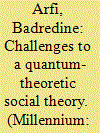

|
|
|
|
|
| Summary/Abstract |
A key claim that Alexander Wendt makes in his book Quantum Mind and Social Science: Unifying Physical and Social Ontology is that he is not using the ‘quantum’ as a metaphor. Nor is he drawing analogies either. He argues that he is constructing a quantum theory of the human subject and social structures through a quantum-theoretic explanation of consciousness undergirded by a panpsychist hypothesis of primitive proto-consciousness. In this article I show how Wendt’s insistence that he is developing a literally-speaking quantum-theoretic approach presents him with a number of must-not-ignore challenges that originate in quantum theory. I specifically discuss three challenges:
|
|
|
|
|
|
|
|
|
|
|
|
|
|
|
|
| 2 |
ID:
175131
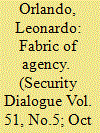

|
|
|
|
|
| Summary/Abstract |
Building on new trends in neuroscience and philosophy of mind, this article provides a roadmap for incorporating consciousness into social research. Drawing upon Alexander Wendt’s Quantum Mind and Social Science, it is argued that one of the greatest obstacles encountered by social research when approaching social reality is that it provides neither an epistemological nor an ontological place for consciousness. The present article intends to address that problem by introducing a sophisticated method of guided introspection that has the potential to revolutionize our understanding of agency. This method, whose epistemological situation is isomorphic to that of quantum physics, enables researchers to gain insight into the structures of decisionmaking processes. Such an endeavor is extremely relevant for security studies: the consideration of consciousness could lead to a radical new understanding of the dynamics of conflict, cooperation, strategic defense, political polarization, radicalization, violent extremism, and terrorism, as well as of the processes of social transformation required to cope with climate change. Moreover, bringing consciousness into social research could foster ongoing biological, evolutionary, and neuroscientific approaches to international relations. Thus, through the introduction of the ‘phenomenal consciousness’ of actors, it is shown how we can dive into the fountainhead of human agency and map mental processes.
|
|
|
|
|
|
|
|
|
|
|
|
|
|
|
|
| 3 |
ID:
175127
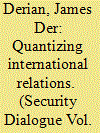

|
|
|
|
|
| Summary/Abstract |
This special issue is conceived out of the proposition that recent developments in quantum theory as well as innovations in quantum technology have profound implications for international relations, especially in the field of international security. Interaction with quantum theory outside the circle of physics has been limited; our goal is to catalyse an informed debate on the virtues of quantum theory for international relations. As new scientific discoveries and technological applications suggest large-scale quantum phenomena, near-simultaneous interconnectivity creates global entanglements, and ubiquitous media produce profound observer-effects, we wish to make of quantum theory a human science. With the arrival of quantum computing, communications and artificial intelligence, we can also expect to see significant transformations in the nature, production and distribution of power and knowledge. This special issue introduces quantum approaches that can help us better understand, anticipate and perhaps even ameliorate the most pressing global issues facing us today and in the near future.
|
|
|
|
|
|
|
|
|
|
|
|
|
|
|
|
| 4 |
ID:
175129
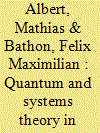

|
|
|
|
|
| Summary/Abstract |
This article provides a sympathetic, yet also somewhat critical, engagement with the notion of ‘quantizing’ by exploring substantive overlaps between quantum and systems theory. It is based on the observation that while quantum theory is ‘non-classical’ in its entire world-view, there is a danger that when it comes to the social world it is simply laid on a world-view of that world, which remains at its core ‘classical’. This situation calls for engaging quantum with existing non-classical social theories. Resemblances between quantum and systems theory are obviously given through similarities around the concepts of observation and meaning, whose status and function in both bodies of theory is explored. We then probe the degree to which obvious analogies in fact could be read as overlaps and similarities that could be put to complementary analytical use: in a sense, we argue that systems theory ‘does’ quantum theory, and vice versa. The article concludes with some vistas of this discussion for the field of international relations.
|
|
|
|
|
|
|
|
|
|
|
|
|
|
|
|
| 5 |
ID:
153176
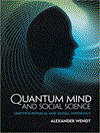

|
|
|
|
|
| Publication |
Cambridge, Cambridge University Press, 2015.
|
| Description |
xii, 354p.pbk
|
| Standard Number |
9781107442924
|
|
|
|
|
|
|
|
|
|
|
|
Copies: C:1/I:0,R:0,Q:0
Circulation
| Accession# | Call# | Current Location | Status | Policy | Location |
| 059081 | 300.1/WEN 059081 | Main | On Shelf | General | |
|
|
|
|
| 6 |
ID:
161635
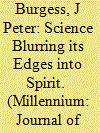

|
|
|
|
|
| Summary/Abstract |
Alexander Wendt’s 2015 Quantum Mind and Social Science is nothing if not true to its aims. Through rigorous argumentation and solid erudition it draws the logical lines from the state-of-the art of quantum theory to social reality. The result is a set of conclusions about the nature of social life that appear both plausible and convincing. And yet the voyage comes at a high price. For in order to reach its goal, Wendt’s reasoning blithely navigates around most traces of meaningful human experience or social relation that do not already hold social scientific currency. It avoids at some pains the deeply spiritual connections that have been made tenable by growing literature connecting Eastern religious thought and theoretical physics. It ignores any and all indices that might point to an explanation of the remaining quantum riddles through a rebooting of our ontological assumptions about quantum theory. Caught in a narrow understanding about question of being as the question of ‘which being’, Quantum Mind and Social Science thus misses the chance for truly insightful discovery about the nature of social relations.
|
|
|
|
|
|
|
|
|
|
|
|
|
|
|
|
| 7 |
ID:
097006
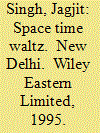

|
|
|
|
|
| Publication |
New Delhi, Wiley Eastern Limited, 1995.
|
| Description |
156p.
|
| Standard Number |
817236105
|
|
|
|
|
|
|
|
|
|
|
|
Copies: C:1/I:0,R:0,Q:0
Circulation
| Accession# | Call# | Current Location | Status | Policy | Location |
| 054923 | 530.143/SIN 054923 | Main | On Shelf | General | |
|
|
|
|
|
|
|
|
|